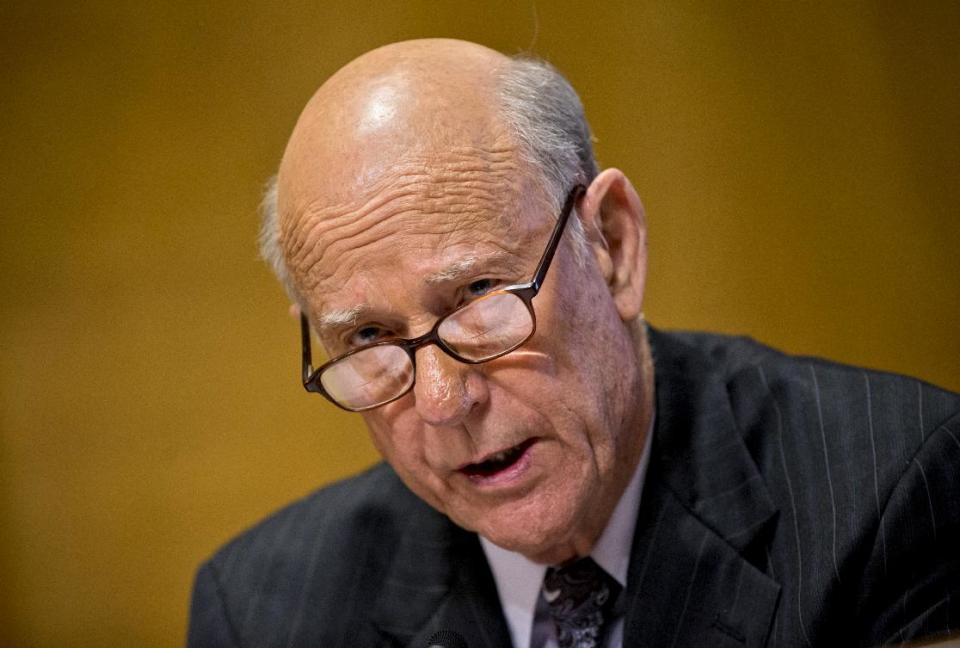Senators hit rivals hard and fast in GOP primaries
WASHINGTON (AP) — Republican senators are attacking GOP challengers earlier and more aggressively than in past elections, including using opposition research to try to knock out upstart rivals before they become serious threats.
These senators are eager to avoid the fate of colleagues who fell victim to tea party-backed rivals they had shrugged off.
In Kentucky, the tea party-backed challenger to Sen. Mitch McConnell is trying to explain old investor letters that recently surfaced, undermining his criticisms of government bailouts of banks.
In Kansas, the physician trying to oust three-term Sen. Pat Roberts is apologizing for posting graphic images of gunshot victims on his Facebook page some years ago.
Both stories have the markings of "opposition research," the term for time-consuming digging into documents that well-funded campaigns often carry out. Campaigns sometimes offer the material as tips to news outlets, or seek to publicize it themselves.
Traditionally, Republicans and Democrats have aimed such efforts mainly at each other, in general elections held in November. The rise of tea party challengers, however, is prompting some Republican incumbents — or their friends in the GOP establishment — to direct early opposition research against intra-party challengers.
This comes after veteran Republican senators in Utah, Indiana and elsewhere were too slow and flat-footed in responding to primary challengers.
Tea party champion Mike Lee kept Utah's Senate seat in Republican hands after knocking off three-term Sen. Bob Bennett in 2010. Indiana Republicans, however, lost a Senate seat when Richard Mourdock ousted 36-year Sen. Richard Lugar in the 2012 primary, only to lose the general election after saying pregnancies resulting from rape were something "God intended to happen."
Mainstream Republican groups that once took a hands-off view of primaries are now active in undermining challengers they view as weaker potential candidates against Democrats.
"We're not anti-conservative," said Rob Collins, executive director of the National Republican Senatorial Committee. "We're just anti-people-who-can't-win."
Collins said his group dug up bankruptcy records that helped knock out a potential tea party challenger to West Virginia Rep. Shelley Moore Capito, seen as the strongest Republican contender for the Senate seat being vacated by Democrat Jay Rockefeller.
Tea party champion Matt Bevin has criticized McConnell for backing a 2008 government bailout of collapsing banks. This month, letters praising the bailout — and bearing Bevin's signature from his days heading an investment firm — surfaced. Bevin said the signatures were a formality that did not reflect his views of the government action.
Kansas radiologist Milton Wolf this weekend said it was inappropriate of him to have posted gruesome X-ray photos of gunshot victims, along with macabre commentary, on Facebook some years ago. The Topeka Capital-Journal reported that the X-rays came from various hospitals.
Wolf apologized and said he had removed the images years ago. He accused Roberts of trying to smear him in the Republican Senate primary. Roberts' campaign said the news report "speaks for itself."
Collins, whose group supports Roberts, defended the tough tactics against Wolf. "Do they have some fantasy that Democrats wouldn't use that?" Collins said of the Facebook images.
Republican strategist Brian Nick said senators have learned from watching the fate of colleagues such as Lugar. The lesson, he said, is "don't allow one of these candidates to get traction, because then they can cause major headaches."


